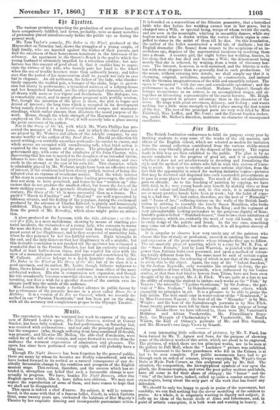The expectation which we ventured last week to express of
the suc- cess of }Alward Loder's opera, The Night Dancers, revived at Covent Garden, has been fully realized. Its first performance, on Saturday last, was received with acclamations ; and not only the principal performers, but the composer (who, though suffering from long-continued ill-health, was present), and likewise Mr. Mellon, the able chef d'orchestre, were called for at the fall of the curtain, and came forward to receive from the audience the warmest expressions of admiration and pleasure. The opera has since been performed every night, and will probably have a long ran.
Though The Night _Dancers has been forgotten by the general public, there are many by whom its beauties are freshly remembered, and who have looked forward to its revival as a natural consequence of any de- cidedly favourable change in the condition and prospects of the English musical stage. This revival, therefore, and the success which has at- tended it, strengthen our belief that such a favourable change is now actually in progress. We have, besides The Sight Dancers, other fine English operas which, like it, have fallen into oblivion. WA may now expect the reproduction of some of them, and have reason to hope that we shall not be disappointed. This opera is indeed a chef d'ouvre. Its subject, it will be remem- bered, is the same with that of a famous ballet, Gist/it, in which Carlotta Grisi, some twenty years ago, enchanted the habitues of Her Majesty's Theatre by her exquisite dancing and incomparable pantomimic action. It is founded on a superstition of the Silesian peasantry, that a betrothed bride who dies before her wedding cannot rest in her grave, but is changed into a Wili, or spectral being, troops of whom revisit the earth, and are seen in the moonlight, whirling in unearthly dances, while any hapless mortal who is drawn within the vortex of their orgies is com- pelled to dance in the midst of them till he dies. On this foundation, the author of the ballet constructed a wild tale of diablerie ; but the English dramatist (Mr. Soane) from respect to the scepticism of an in- credulous age, disposes of the supernatural incidents by resolving them into a dream. A country girl, the night before her wedding, fancies in her sleep, that she has died and become a Wili ; the denouement being merely that she is relieved, by waking, from a train of visionary hor- rors. The interest, however, is well sustained, and the libretto is writ- ten with more elegance than we generally find in such productions. Of the music, without entering into details, we shall simply say that it is charming, original, melodious, masterly in construction, and imbued with the German imaginativeness of the wild and unearthly subject. The opera is "mounted" with due care and considerable splendour; and the performance is, on the whole, excellent. Madame Palmieri, though she betrays inexperience as an actress, is an accomplished singer, and al- together an interesting representative of the rustic heroine. Mr. Haigh has never appeared to greater advantage than in the character of the lover. He sings with great sweetness' delicacy, and feeling ; and wants nothing but a little more strength to hold a place among the first tenors of the day. The rest of the principal parts are very well filled by Miss Thirlwall, Miss Leffler, and Mr. Corri ; and the Covent Garden orches- tra, under Mr. Mellon's direction, maintains its character of unsurpassed excellence.


























 Previous page
Previous page